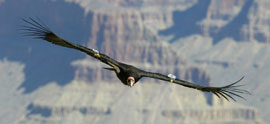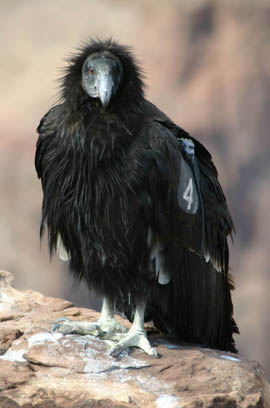Cronkite News has moved to a new home at cronkitenews.azpbs.org. Use this site to search archives from 2011 to May 2015. You can search the new site for current stories.
State wants court to dismiss suit that would ban use of lead ammunition
WASHINGTON – The Arizona Game and Fish Department wants a federal court to dismiss a lawsuit by conservation groups that aims to ban the use of lead ammunition in the Kaibab National Forest.
The suit, filed in September against the U.S. Forest Service by the Center for Biological Diversity, the Sierra Club and the Grand Canyon Wildlands Council, says that spent lead ammo in the forest can poison condors and other birds there.
But state officials have asked the U.S. District Court in Prescott to let them intervene in the suit, calling a ban counterproductive and arguing that the federal government could not enforce a ban anyway.
“They’re asking the Forest Service to ban lead when it does not have jurisdiction over the area,” said Lynda Lambert, a spokeswoman with the state game department. “The state is the only one with authority to make changes in hunting regulations.”
A Forest Service spokeswoman said the agency could not comment on the issue because it is under litigation.
Condors are scavengers and will typically eat the remains of a dead animal or its “gut pile,” which can include spent ammo, making the birds sick in the process.
But Lambert said there does not need to be a ban on lead ammo because a department program, that asks hunters to voluntarily use non-lead ammunition or to pick up animal carcasses, is already working well. She said that 80 to 90 percent of hunters in Kaibab now take lead-reduction measures.
But Sandy Bahr, director of the Sierra Club’s Grand Canyon Chapter, said the volunteer program is not enough, noting the recent death of a bald eagle from lead poisoning.
“This is about more than condors,” she said. “This is about how the Forest Service is allowing toxic lead to spread across the Kaibab.”
She said the Forest Service is an appropriate target for the suit because the Kaibab is public land. The service “has a responsibility to the state and to this country” to prevent the use of lead ammo, she said, because it contains dangerous toxins that can kill the birds.
But Lambert said that condors were reintroduced in 1996 under a rule that promises that no significant new regulations would be imposed. Adding regulations now would be going back on that promise and could cause people to lose trust in the government, she said.
That lack of public trust could “jeopardize future reintroduction measures,” she said.
Lambert said the department has also asked conservation groups – including the three that filed the suit – to help it perform “on-the-ground” conservation efforts. She said the groups could do more good by spending their money on those efforts rather than on the lawsuits.
But Bahr said the Sierra Club does engage in conservation efforts, and denied that it has ever been invited by the department to help.
“I have to say, I am so outraged by what they put out,” Bahr said. “I don’t know what invitations they are talking about, but we haven’t gotten any.”
She still believes the conservation groups have a strong case and said it is an issue she will fight for, despite the state’s request to get involved in the lawsuit.
“I don’t think this changes the case at all,” Bahr said.








